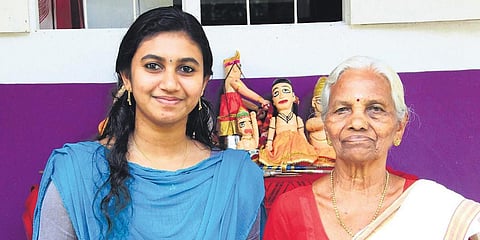

KOTTAYAM: Sitting on a bamboo mat spread on the floor, legs straightened and face pointing upwards, her focus is fully on a puppet at the end of a nearly two-feet-long stick placed on her philtrum. As she pulled the strings attached to the puppet with her hands, it started moving rhythmically to a traditional song.
In an hour-long performance, the puppet told various stories related to the epics, Ramayana and Mahabharata, dancing to the dexterity of her hands.
This is 'nokkuvidya pavakali', a distinct form of puppetry that belongs to the traditional folklore of Kerala. And the devoted performer, KS Renjini. Only a few know that the 22-year-old -- belonging to Monippally in Kottayam district -- is now the lone artist performing this traditional artform of Kerala.
ALSO SEE:
Granddaughter of ace puppeteer and Padma Shri recipient Moozhikkal Pankajakshi, who dedicated her life to propping up the form, Renjini has embarked on a mission to keep the tradition alive. She started learning the basics from her grandmother at the age of eight.
When age-related issues forced Pankajakshi, now 85, to put an end to her decades-long performances -- across the country and even abroad -- around seven years ago, she passed on the nuances of the art to her granddaughter.
"This is a special artform that needs high levels of concentration and training. The duration of a performance is one hour and the performer shouldn’t lose eye contact even for a fraction of a second as the puppet is balanced at the end of a stick placed between the nose and the upper lip of the artist," Renjini says.
According to belief, the artform originated from Lord Shiva, who carved out a few human forms from the wood of ezhilam pala (alstonia scholaris) and performed using them to please his wife, Parvathi.
Renjini, who holds a BCom degree and is learning Tally, managed to continue her studies alongside the art. She also shared her concern over the dwindling acceptance for traditional artforms among the younger generation.
"When I was young, we had a lot of stages during temple festivals. However, such traditional artforms have given way to dance performances and others preferred by the new generation," she says.
Her stages have shrunk for tourism festivals and Onam celebrations, and most of them are booked through the Folklore Academy. In an attempt to protect the unique art, Renjini decided to find interested people to train.
"My grandmother had an opportunity to perform nokkuvidya pavakali in Paris in 2008, and I accompanied her. On our return, she was worried as she couldn’t perform up to the expectation due to age-related health issues. I decided to learn the techniques when she shared her concern that such a unique art would die if she stopped performing," Renjini recalls.
To fulfil her grandmother’s wish to keep the art alive, she is planning to set up a trust and to train the new generation. One obstacle Renjini faced in the initiative was that she failed to get the trust registered for nokkuvidya pavakali, as it was not in the list of registered artforms of Kerala.
She has requested the government to remove such impediments.
"Nokkuvidya pavakali is now known to more people, thanks to the Padma Shri award given to my grandmother. However, plenty of people are still unaware of the art and we intend to widen its acceptance," she says.